

Sam Judd: Valuable poop - The Changing World. The Economics of Enough – Is ‘Listening’ the new Black? Mayhem on Markets…said The Age headlines – Stocks dive on global fears.
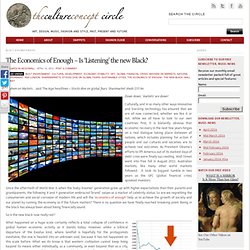
Reimagining Capitalism - Polly LaBarre. GreenBiz.com. Happiness Is The Ultimate Economic Indicator. One factor that is increasingly being cited as an important economic indicator is happiness.
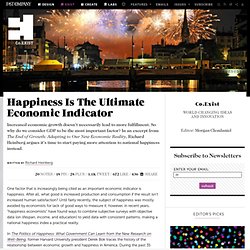
After all, what good is increased production and consumption if the result isn’t increased human satisfaction? Until fairly recently, the subject of happiness was mostly avoided by economists for lack of good ways to measure it; however, in recent years, “happiness economists” have found ways to combine subjective surveys with objective data (on lifespan, income, and education) to yield data with consistent patterns, making a national happiness index a practical reality. In The Politics of Happiness: What Government Can Learn from the New Research on Well-Being, former Harvard University president Derek Bok traces the history of the relationship between economic growth and happiness in America.
Achieving Sustainable Development for the Global Economy. What's the Latest Development? The global economy is on an unsustainable path. In other words, it cannot supply the resources required by future generations while preserving an ecosystem in which we can all live healthily. By 2030, the world's population will require 50 percent more food, 45 percent more energy and 30 percent more water. A narrow set of interests that produces inequality, both within and between countries, has superseded common interests and common responsibilities, says the UN Secretary-General's High-level Panel on Global Sustainability.
Big Ideas For A New Economy: Social Currency Unleashed. In last week’s article we suggested alternative currency was one of the "next big things” for the new economy.
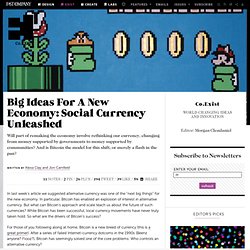
In particular, Bitcoin has enabled an explosion of interest in alternative currency. But what can Bitcoin’s approach and scale teach us about the future of such currencies? While Bitcoin has been successful, local currency movements have never truly taken hold. Water Conserve Action Alerts. The Problem with the Profit Motive in Finance - Justin Fox.
5 Big Ideas For A New Economy. An exciting moment is upon us, where some of the assumptions that have long governed our economy are beginning to unravel.

There is the possibility that we could come out of this recession with a new concept of what the economy is, who it serves, and how it works. Reflecting on history, we know that moments for truly re-thinking the economy are scarce. The replacement of mercantilism with liberal economic theory was such a moment. Al Gore and David Blood: A Manifesto for Sustainable Capitalism. UN project shows how trees help halt desertification. 20 June 2011Last updated at 17:22 By Mark Kinver Science and environment reporter, BBC News.

The Next Global Economy Asks Companies To Create More Than Just Profit. The global economy is a human construct--a tool. And every so often, it gets radically updated, as it did after World War II at the historic Bretton Woods conference, where a new global monetary and financial architecture was laid down. Already, economists at governments, universities, and international agencies are hard at work laying the groundwork for the next global economy. Its contours? New systems of national accounts that explicitly count not just gross product, but the full spectrum of wealth creation.
I’ve called for countries to build national balance sheets, that take into account more than just GDP. Will the End of Oil Mean the End of Growth? - Environment. It’ll be nice when this recession is over and the economy starts chugging along again. When GDP resumes its ordained upward trajectory. When we finally get back to growth. After all, the economy should always be growing, right? Capitalism’s future part 1: Why we can’t ignore a rethink. We’ve heard it being said many times, especially on a Sunday afternoon National Geographic special, “You can remove all animals from earth and man won’t survive but remove man and animals will survive.”
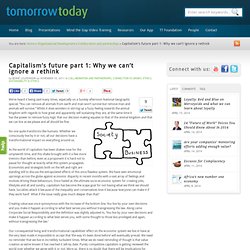
Plexus Institute: Thursday Complexity Post Global Economies. New Network Study Suggests Tight Connectivity in Global Economies is Inevitable and Dangerous.
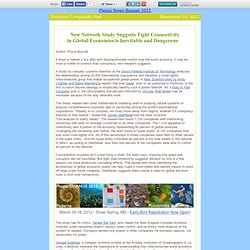
Eliminative Materialism. First published Thu May 8, 2003; substantive revision Tue Apr 16, 2013 Eliminative materialism (or eliminativism) is the radical claim that our ordinary, common-sense understanding of the mind is deeply wrong and that some or all of the mental states posited by common-sense do not actually exist.

Descartes famously challenged much of what we take for granted, but he insisted that, for the most part, we can be confident about the content of our own minds. Eliminative materialists go further than Descartes on this point, since they challenge the existence of various mental states that Descartes took for granted. Conscious Capitalism: Accelerating the Integration of Consciousness & Capitalism™ Logout. Blueeconomy: Green Economy 2.0 -The Community functions as a platform for companies, innovators and scientists. The Future of Management: Is it Deja vu all over again? Intertemporal Selfishness. It turns out that we have widely varying levels of psychological connectness to our future selves, and the ‘me’ of today is more likely to defer rewards to the future if there is a belief that the ‘me’ of a distant tomorrow will be very like today’s.
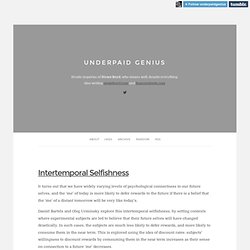
Daniel Bartels and Oleg Urminsky explore this intertemporal selfishness, by setting contexts where experimental subjects are led to believe that their future selves will have changed drastically. In such cases, the subjects are much less likely to defer rewards, and more likely to consume them in the near term. This is explored using the idea of discount rates: subjects’ willingness to discount rewards by comsuming them in the near term increases as their sense on connection to a future ‘me’ decreases. I suppose that the sense of connectedness with future groups — families, communities, nations — plays an important role in our willingness to defer rewards for their benefit. (via James Warren) related articles. UN releases blueprint for ‘green’ economic growth. The United Nations Environment Programme (UNEP) today announced that it had drafted a blueprint for transitioning the world to a greener future while preserving – and potentially even accelerating – predicted economic growth.
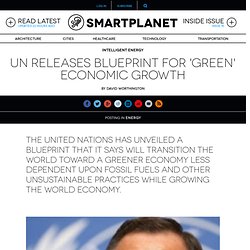
The UPEP report, Towards a Green Economy: Pathways to Sustainable Development and Poverty Eradication, called for investing $1.3 trillion a year (approximately 2 percent of yearly world GDP) into ten key sectors: agriculture, buildings, energy, fisheries, forestry, industry, tourism, transport, waste, and water. Governments already spend between 1-2 percent of subsidizing fossil fuels and unsustainable fisheries, the report notes. The UN believes that trillions of dollars in private capital will follow public investments.
The report cited multiple examples of how “green” initiatives can effectively fight poverty in the developing world. There is mounting evidence that “green” initiatives can indeed propel economic growth, despite aggressive rhetoric to the contrary. Study: When it comes to corporate sustainability, it doesn’t pay to wait. The second annual Sustainability & Innovation study from MITSloan and Boston Consulting Group shows that enthusiasm for corporate sustainability grew substantially over the past year. Redefining Progress. A Better Way to Win: Profiting from Purpose. Conscious Capitalism. Interviews Home Page.